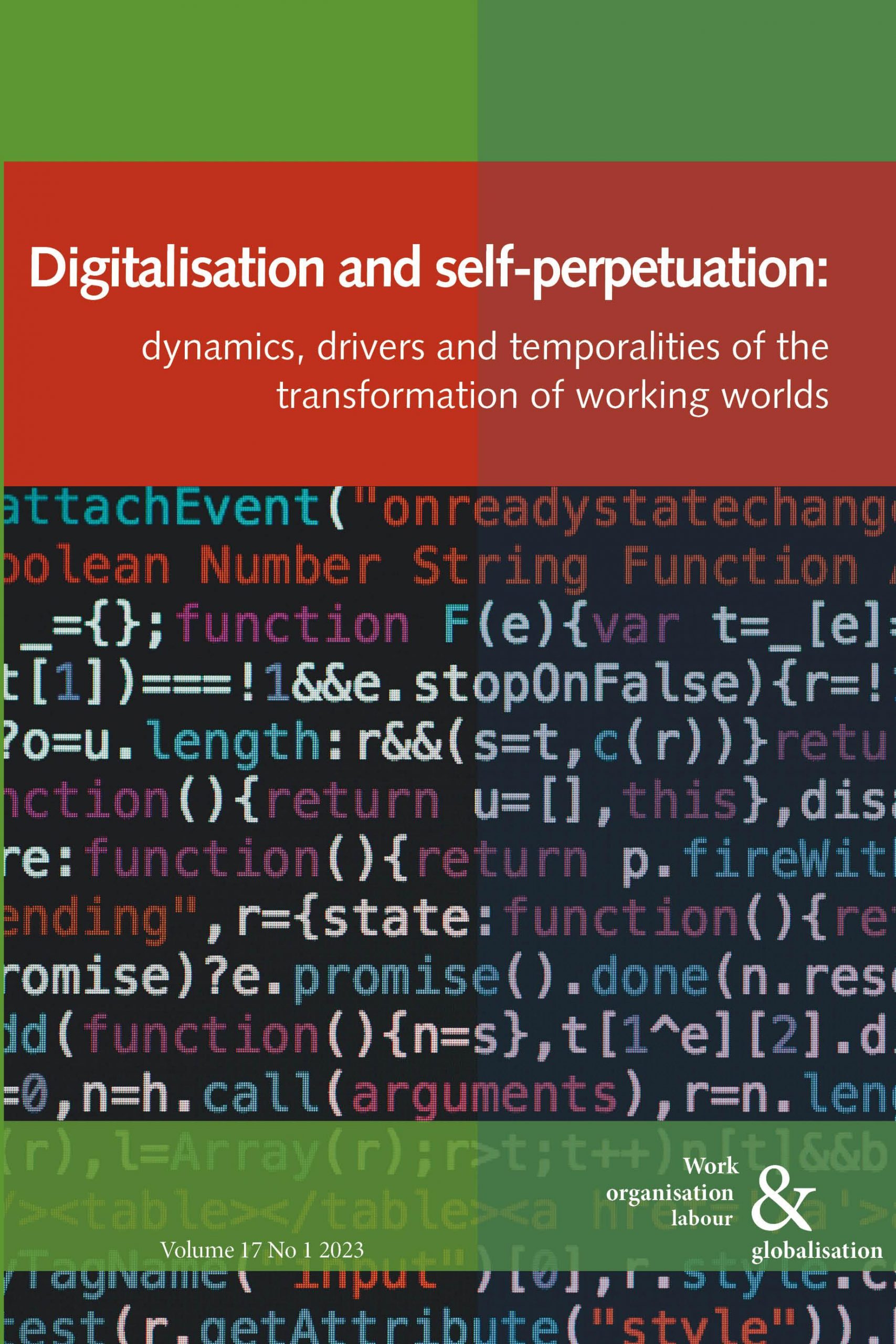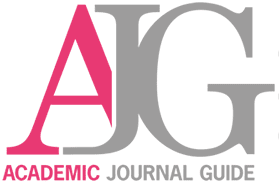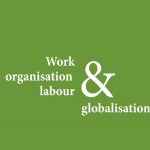
Work Organisation, Labour & Globalisation
This journal aims to bring together insights from political economy, the sociology of work, organisational theory, economic geography, development studies, industrial relations, comparative social policy, communications studies, technology policy and gender studies, to create a single authoritative source of information on the new global division of labour, combining theoretical analysis with the results of empirical research in a way that is accessible both to the research community and to policy makers.
Print ISSN: 1745-641X
Online ISSN: 1745-6428
The globalisation of world trade in combination with the use of information and communications technologies is bringing about a new international division of labour, not just in manufacturing industries, as in the past, but also in work involving the processing of information.
Organisational restructuring shatters the unity of the traditional workplace, both contractually and spatially, dispersing work across the globe in ever-more attenuated value chains.
A new ‘cybertariat’ is in the making, sharing common labour processes, but working in remote offices and call centres which may be continents apart and occupying very different cultural and economic places in local economies. The implications of this are far-reaching, both for policy and for scholarship. The dynamics of this new global division of labour cannot be captured adequately within the framework of any single academic discipline. On the contrary, they can only be understood in the light of a combination of insights from fields including political economy, the sociology of work, organisational theory, economic geography, development studies, industrial relations, comparative social policy, communications studies, technology policy and gender studies.
This journal aims to bring together insights from all these fields to create a single authoritative source of information on the new global division of labour, combining theoretical analysis with the results of empirical research in a way that is accessible both to the research community and to policy makers.
- Newsletter notifications for each latest Work Organisation, Labour and Globalisation (WOLG) edition with the table of contents and links to articles, book reviews, or books in brief.
- Mailings with news, calls for papers for special issues, notifications of events including webinars and conferences.
- Online webinars.
- A special 40% discount on selected Pluto Books every quarter, including its backlist.
- Provide a single home for articles which specifically address issues relating to the changing international division of labour and the restructuring of work in a global knowledge-based economy.
- Bring together the results of empirical research, both qualitative and quantitative, with theoretical analyses in order to inform the development of new interdisciplinary approaches to the study of the restructuring of work, organisational structures and labour in a global context.
- Be global in scope, with a particular emphasis on attracting contributions from developing countries as well as from Europe, North America and other developed regions.
- Encourage a dialogue between university-based researchers and their counterparts in international and national government agencies, independent research institutes, trade unions and civil society as well as other policy makers. Subject to the requirements of scholarly peer review, it is open to submissions from contributors working outside the academic sphere and encourages an accessible style of writing in order to facilitate this goal.
- Complement, rather than compete with, existing discipline-based journals.
- Bring to the attention of English-speaking readers relevant articles originally published in other languages.
Editor
Ursula Huws, Director of Analytica Social and Economic Research.
Editorial Board
- Ludmila Abilio, Postdoctoral Researcher, Centre for Labour and Trade Union Studies, University of Campinas, Brazil
- Moritz Altenried, Postdoctoral Fellow, Department of European Ethnology, Humboldt University, Berlin, Germany
- Ricardo Antunes, Professor of Sociology, University of Campinas, Brazil
- Chris Benner, Department of Geography, University of California at Davis, USA
- Michael Brookes, Professor of Human Resources, University of Southern Denmark, Denmark
- Enda Brophy, Associate Professor, School of Communication, Simon Fraser University, Canada
- Manuel Castells, Emeritus Professor, Department of City and Regional Planning, University of California, Berkeley, USA
- Mikyung Chin, Department of Political Science, Ajou University, Korea
- Nicole Cohen, Associate Professor, Institute of Communication, Culture, Information and Technology, University of Toronto, Canada
- Premilla D’Cruz, Professor of Organizational Behaviour, Indian Institute of Management, Ahmedabad, India
- Jörg Flecker, Professor of Sociology, University of Vienna, Austria
- Brian Garvey, Lecturer in Work, Employment and Organisation, University of Strathclyde, UK
- Sujata Gothoskar, International Union of Food Workers, Mumbai, India
- Mark Graham, Professor of Internet Geography, Oxford Internet Institute, Oxford University, UK
- Barbara Harriss-White, Emeritus Professor of Development Studies, Queen Elizabeth House, Oxford University, UK
- Christoph Hermann, Lecturer, Department of History, University of California, Berkeley, USA.
- Jing Hiah, Assistant Professor of Criminology, Erasmus School of Law, Erasmus University, Rotterdam, Netherlands.
- Tsvetelina Hristova, Teaching Fellow in Global Media Management, University of Southampton, UK.
- Greti-Iulia Ivana, lecturer in Sociology, School of Social and Political Sciences, University of Glasgow, UK.
- Anne Jourdain, Associate Professor, Interdisciplinary Social Science Research Institute (IRISSO), Paris-Dauphine University, France
- Eleni Kambouri, Senior Research Fellow, Centre for Gender Studies, Panteion University of Social and Political Science, Athens, Greece.
- Vassil Kirov, Institute of Sociology, Bulgarian Academy of Sciences, Sofia, Bulgaria
- Bettina-Johanna Krings, Head of Technology Assessment and Systems Analysis Unit, Karlsruhe Institute of Technology, Germany
- Wing-Fai Leung, Director of Research, Department of Culture, Media and Creative Industries, King’s College London, UK
- Tatiana Mazali, Department of Regional and Urban Studies and Planning, Polytechnic of Torino, Italy
- Pamela Meil, Institut für Sozialwissenschaftliche Forschung (ISF), Germany
- George Morgan, Associate Professor, Institute for Culture and Society, School of Humanities and Communication Arts, Western Sydney University, Australia
- Rajneesh Narula, Professor of International Business Regulation, University of Reading Business School, UK
- Maurilio Pirone, Postdoctoral Research Fellow, University of Bologna, Italy
- Sabine Pfieffer, Professor of Sociology, University of Hohenheim, Stuttgart, Germany
- Jaka Primorac, Senior Research Associate, Institute for Development and International Relations, Dubrovnik, Croatia
- Markus Promberger, Head of Welfare, Labour and Social Inclusion Research, IAB (Institute for Employment Research), Federal Employment Agency, Germany
- Monique Ramioul, Head of Labour Sector, Higher Institute of Labour Studies, Catholic University of Leuven, Belgium
- Ned Rossiter, Professor of Communication, School of Humanities and Communication Arts, Western Sydney University, Australia
- Neil Spencer, Professor of Applied Statistics, University of Hertfordshire, Hatfield, UK.
- Paul Stewart, Senior Research Professor, Sociology of Work and Employment, Département, Homme Organisation et Société, Grenoble School of Management, France.
- Aditi Surie, Consultant, Indian Institute for Human Settlements, Bangalore, India.
- Geert van Hootegem, Professor of Sociology, Katholieke Universiteit Leuven, Belgium
- Patricia Vendramin, Professor of Sociology, University of Louvain-la-Neuve, Belgium
Please see the submission guidelines here.
Special Edition: Call for papers: Hierarchies of domesticity – spatial and social boundaries. the submission guidelines are here. The same peer review process and editorial oversight is carried out on content submitted to and published in the special issues as for standard-issues content. Submissions is 30th September, 2024. This special issue proposes to explore the continuum of globalized domesticities by examining the various social and spatial boundaries that exist between employers and employees across a diversity of work settings. The editors This special issue will be edited by: Claire Cosquer, University of Lausanne (UNIL), Sébastien Chauvin, University of Lausanne (UNIL), and Julien Debonneville, University of Applied Sciences and Arts, Western Switzerland (HETSL | HES-SO).
Journal’s Editor, Ursula Huws, ursulahuws@analyticapublications.co.uk
Publisher Pluto Journals, evek@plutojournals.com
The Journal is published twice a year, in July and December. The Journal is indexed in Scopus. The journal has been indexed on DOAJ since March 2023. The electronic journal is archived in Portico. The Journal’s website can be found here.
The journal is Open Access and the Open Access statement, Open Access license terms, copyright terms as well as a statement on its absolute lack of author charges can be found here.
The journal became Open Access on 1 January 2021 and is published open access on ScienceOpen. All journal material published prior to 1 January 2021 is also published, open access on ScienceOpen. This means the Reuse rights of published material is all under the open CC BY 4.0 license as stated here.
We are sometimes asked for a statement describing the ethical code of practice for Work Organisation, Labour and Globalisation.
This has several dimensions.
In relation to the research we publish
We expect our authors to carry out their research in accordance with the principles of the RESPECT code of practice. This code is based on the recognition that researchers have to balance three principles: the avoidance of personal and social harm; upholding scientific standards; and respect for the law (including data protection and intellectual property law). These principles sometimes come into conflict with each other and it is our view that it is the responsibility of professional researchers, both inside and outside the academy, to balance these, and the responsibility of their employers, trade unions and professional associations to support them in this.
In relation to our reviewing practices
All articles published in the journal (with the exception of book reviews and introductions to special issues) are reviewed anonymously in a double-blind process (with the identities both of authors and of reviewers concealed from each other) to avoid bias or discrimination (conscious or unconscious) on the grounds of gender, ethnicity, seniority or other variables that are irrelevant to the scientific excellence of the article.
In relation to our editorial activities
We abide by the code of conduct of the National Union of Journalists.
The journal adheres to the ethical standards endorsed by the Committee on Publication Ethics. In particular:
- We expect all authors to state in their article if they have a conflict of interest which could
potentially bias their opinions – for example funding or employment. - All named authors on the articles should confirm that they have jointly participated in the research and writing of the article, and that no author has been omitted from the list of authors.
- We require authors to warrant that their articles are original, have not been previously
published, and do not plagiarise or otherwise copy someone else’s work without attribution. (If the article is a translation, we are happy to consider this for publication but the authors must inform the editors on submission). - We also require authors to warrant that their article does not defame, libel, or bring another
person into disrepute, and neither does it contain anything illegal (e.g. copyright infringing).
WOLG Community & Membership
Work Organisation, Labour and Globalisation is more than just a journal. It has evolved into an extended global community of scholars interested in developing a dialogue about the changing nature of work and labour organisation that crosses disciplinary and national boundaries. Going open access and making all our articles free to read has more than tripled our readership and greatly increased this community. We receive positive feedback from many quarters. Policy makers tell us that they value the way WOLG makes them aware of new developments in the world of work. PhD students and early career researchers working in new or interdisciplinary fields say our articles help them to identifying the key authors and issues and more established scholars rely on us as a way of staying in touch with rapidly changing debates. We are also praised for helping to bridge the ‘North-South divide in academia’.
Help keep Work Organisation, Labour and Globalisation Open Access. Become a supporting member and join our WOLG community. We are strongly committed to making our content available free of charge but unfortunately it does cost money to publish a journal. Although our editors and peer reviewers volunteer their time, we still have to pay for a range of services from software licenses to professional copy editing. By becoming a supporting member, you can not only help sustain the journal but also play an active role in the WOLG community, gaining advance notification of future issues, free participation in online webinars and other benefits. There are three levels of membership to select from below.
WOLG Community & Membership
Work Organisation, Labour and Globalisation (WOLG) is more than just a journal. It has evolved into an extended global community of scholars interested in developing a dialogue about the changing nature of work and labour organisation that crosses disciplinary and national boundaries.
WOLG going open access and making all our articles free to read has more than tripled our readership and greatly increased this community. Help keep WOLG Open Access. Become a supporting member and join our WOLG community. We are strongly committed to making our content available free of charge but unfortunately it does cost money to publish a journal. Although our editors and peer reviewers volunteer their time, we still have to pay for a range of services from software licenses to professional copy editing. By becoming a supporting member, you can not only help sustain the journal but also play an active role in the WOLG community, gaining advance notification of future issues, free participation in online webinars and other benefits. There are three levels of membership to select from below.
-
Work Organisation, Labour & Globalisation
WOLG individual membership higher fee Annual
$30.00 / year Join Here -
Work Organisation, Labour & Globalisation
WOLG individual membership lower fee Annual
$12.00 / year Join Here -
Work Organisation, Labour & Globalisation
WOLG Institutional membership fee Annual
$60.00 / year Join Here
Individual membership lower fee is for students, pensioners or workers or low-waged workers.
Individual membership higher fee is for those on a full salary.
Institutional membership is for university departments, government bodies, trade unions or other institutions.
- Newsletter notifications for each latest Work Organisation, Labour and Globalisation (WOLG) edition with the table of contents and links to articles, book reviews, or books in brief.
- Mailings with news, calls for papers for special issues, notifications of events including webinars and conferences.
- Online webinars.
- A special 40% discount on selected Pluto Books every quarter, including its backlist.





